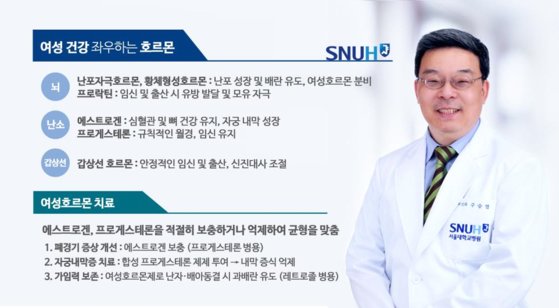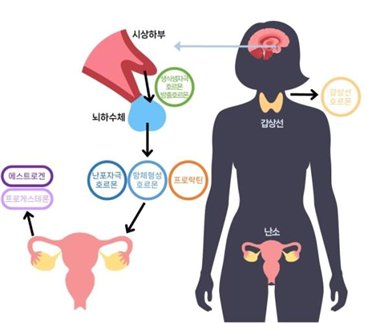photo shutterstock
Ms. Kim, a 33-year-old woman, had irregular menstruation and severe menstrual pain since she was young. I didn’t pay much attention to it in my 20s, but after getting married last year and planning a pregnancy, I started to become interested in treatment methods. Realizing that it is fundamentally a problem with female hormone imbalance, I am managing it by taking nutritional supplements recommended by those around me, but it is difficult to shake off concerns about possible side effects.
Like Kim, many people recognize the importance of hormonal balance in women’s health, but are confused about how to specifically restore balance. Female hormone treatment is known to be mainly necessary for postmenopausal women, but it is also used for a variety of purposes, such as treating infertility, improving menstrual irregularities, and contraception. This is because female hormones are closely related to almost the entire female body, including menstruation, pregnancy, and lactation, as well as bone density and cardiovascular health. Hormone treatment methods vary depending on the purpose, including oral or topical medications, vaginal tablets, injections, or patches. We have summarized the best cases and precautions when considering female hormone treatment based on the advice of Professor Seung-yeop Koo of the Department of Obstetrics and Gynecology at Seoul National University Hospital.

Professor Koo Seung-yeop, Department of Obstetrics and Gynecology, Seoul National University Hospital. Photo: Seoul National University Hospital
A typical case in which hormone therapy can be helpful is when you have menopausal symptoms. After menopause, menopausal women experience a rapid decrease in estrogen, a representative female hormone. As a result, 9 out of 10 people experience facial flushing, cold sweats, sleep disturbances, and in some cases, vaginal dryness and cystitis. In particular, women who have experienced early menopause before the age of 40 are prone to health problems due to rapid aging.
In this case, using hormone replacement therapy that supplements female hormones can relieve symptoms and improve bone density, helping prevent osteoporosis. If estrogen is administered alone for a long period of time, it can promote the growth of the endometrium and cause endometrial cancer, but it can be prevented if used together with progesterone.
Endometriosis Treatment
Recently, hormonal treatment has been actively used for endometriosis. Endometriosis is a disease in which endometrial tissue grows in areas other than the uterus, causing tumors such as the ovaries. It is so common that it is diagnosed in 1 in 10 women and 3 to 5 out of 10 infertile women. In the past, it was mainly treated with surgery, but recently, hormonal treatment using progestin (synthetic progesterone preparation) is also widely used.

Female hormone secretion system. Data: Seoul National University Hospital
Female hormone therapy is also used to preserve fertility. In particular, for female cancer patients of childbearing age, hormone treatment plays an important role in preserving the possibility of pregnancy and childbirth. For example, there were many concerns that women diagnosed with breast cancer would have to give up pregnancy while receiving chemotherapy, but recently, they have been able to consider preserving their fertility through egg and embryo freezing. In this process of egg and embryo freezing, hormones are administered to induce egg superovulation, and the abnormal rise in female hormones caused by this is suppressed with hormonal agents such as letrozole, thereby increasing the safety of the freezing process. Although rare, there are cases where a woman with early-stage endometrial cancer received anti-cancer hormone treatment instead of having her uterus removed and gave birth to a healthy baby through in vitro fertilization.
“It is dangerous to take hormones like vitamins.”
Although the importance and role of hormone therapy are increasing, caution is needed when patients arbitrarily take hormones. Professor Koo Seung-yeop said, “It can be dangerous to take hormones carelessly, thinking of them as health supplements or functional preparations like vitamins,” and added, “This is because even a very small amount can cause serious side effects such as abnormal bleeding or thrombosis.”
Professor Koo said, “If you have a problem with women’s health, such as amenorrhea, endometriosis, or menopausal symptoms, it is necessary to consult with an obstetrician/gynecologist specializing in endocrinology to develop a hormone treatment plan optimized for your situation and follow-up.”
Reporter Nam Soo-hyun [email protected]
![[PRNewswire] ZTE hosts 5G Summit & User Congress 2024 in Turkiye [PRNewswire] ZTE hosts 5G Summit & User Congress 2024 in Turkiye](https://img4.yna.co.kr/etc/inner/PR/2024/11/08/RPR20241108008800353_01_i_P4.jpg)
